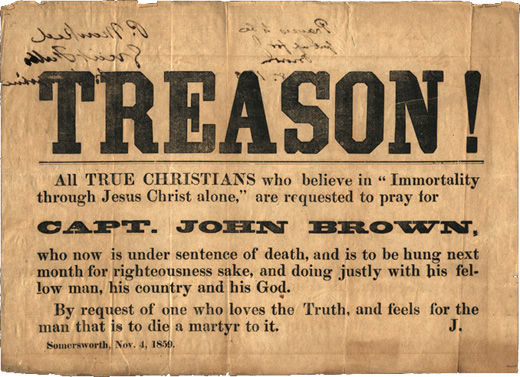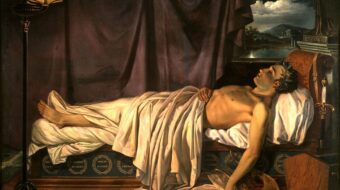
On Dec. 2, 1859, abolitionist John Brown was hanged in Charles Town, Va., (now W. Va.)., for his leadership of a plot to incite slave rebellion.
Two months earlier, Brown led the attack on the federal arsenal at Harpers Ferry, Virginia (now part of West Virginia). Brown, a minister and fierce opponent of slavery, sought to obtain weapons from the arsenal to defeat the slavocracy in the South.
A group of 21 men raided the arsenal. Five of the men were African American: three free African Americans, one a freed slave and one a fugitive slave. (During this time assisting fugitive slaves was illegal under the Fugitive Slave Act.) They attacked and captured several buildings; Brown hoped to use the captured weapons to initiate a slave uprising throughout the South.
The raid, which some consider the opening battle of the Civil War, was unsuccessful. Brown was tried for treason against the Commonwealth of Virginia, the murder of five men and inciting a slave insurrection. He was found guilty on all counts and was hanged.
The abolitionist movement was a revolutionary struggle to end chattel slavery in the American republic. The Nat Turner slave rebellion was a force influencing all that followed Among the major figures in the movement: Angelina Grimke, a daughter of Southern slaveholders, turned against the system that she initially saw as corrupting white slaveholders. An intellectual, William Lloyd Garrison, impelled by both the religious and secular spirit of the time to seek a more perfect society, became the voice and the pen of the movement. A slave, Frederick Douglass, came to fight back against the “slave breaker” brought in to beat him into submission. And the murder of Elijah Lovejoy, an abolitionist editor in Alton, Illinois, in 1837, inspired John Brown to dedicate his life to the destruction of slavery.
Frederick Douglass and other abolitionists did not follow Brown to Harper’s Ferry, viewing the attack as ill timed and ill advised. Still W.E.B. Du Bois said the assault “did more to shake the foundations of slavery than any single thing that ever happened in America.”
Brown’s strategy was essentially to deplete Virginia of its slaves, causing the institution to collapse in one county after another, until the movement spread across the South, wreaking havoc on the economic viability of the pro-slavery states. From the point of view of the slave owning Southern oligarchy, any effort to arm the enslaved was perceived as a definitive threat.
In his biography of Brown, Du Bois said the following about Brown’s legacy:
“Was John Brown simply an episode, or was he an eternal truth? And if a truth, how speaks that truth today? John Brown loved his neighbor as himself. He could not endure therefore to see his neighbor, poor, unfortunate or oppressed. This natural sympathy was strengthened by a saturation in Hebrew religion which stressed the personal responsibility of every human soul to a just God. To this religion of equality and sympathy with misfortune, was added the strong influence of the social doctrines of the French Revolution with its emphasis on freedom and power in political life. And on all this was built John Brown’s own inchoate but growing belief in a more just and a more equal distribution of property. From this he concluded, — and acted on that conclusion — that all men are created free and equal, and that the cost of liberty is less than the price of repression.”
Image: “Treason” Broadside, 1859 November 4. Somersworth. Wikipedia, public domain.
This article was updated with the correct city in which John Brown was executed. It was Charles Town, Va., (now W. Va.), not Charleston, W.Va. We regret the error.












Comments